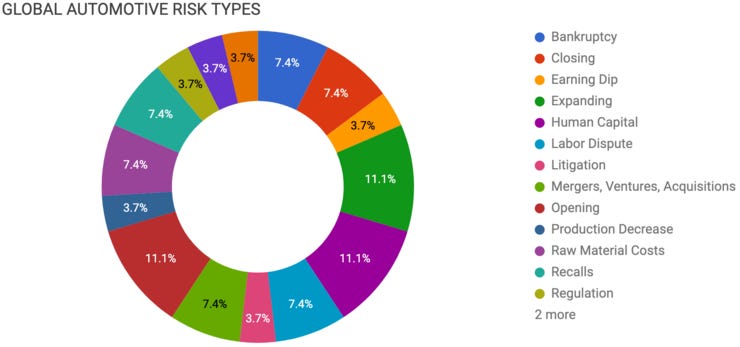Elm Analytics - Automotive Supply Chain Risk Digest #299 - October 28 - November 3, 2022
BANKRUPTCY
The Stellantis and GAC joint venture in China will file for bankruptcy after Stellantis decided to end the venture this past July.
Britishvolt is considering entering into administration after struggling to find investors to build its gigafactory in England.
CLOSING
Tenneco is closing its Jeffersonville, Indiana facility due to "loss of business." The location made emission control products such as catalytic converters.
GKN Driveline is closing its Sanford plant in North Carolina by March 31, 2023, citing manufacturing reorganization.
EARNING DIP
Ford's October earnings slid 10% even though EV sales grew.
EXPANDING
Pirelli is expanding its Silao, Mexico, plant from 172k sq ft to 2.3M sq ft to increase yearly capacity from 7.2M to 8.5M tires.
Midwest Acoust-A-Fiber is acquiring G&G Industries and plans to expand its Shelby Township, Michigan facility.
Tesla has begun clearing land in preparation for the expansion of its Berlin-Brandenburg Gigafactory.
HUMAN CAPITAL
Lyft is laying off 683 employees (around 13% of its workforce) to cut costs.
Autonomous vehicle startup Argo AI is closing its doors due to its principal backers, Ford and VW pulling support. While some workers "may be offered employment with e a new company," 173 employees will be laid off.
Subaru says it will not build EVs in the US for an interesting reason: A McDonald's near their US plant in Lafayette, Indiana, is paying competitive wages.
LABOR
The UAW says it is seeking an election to represent workers at GM and LG's joint venture Ultium Cells plant in Warren, Ohio. The union claims that despite around 900 plant workers signing cards authorizing representation, Ultium has refused to recognize the UAW.
It also believes Ford's "Louisville Assembly is a key focus in the upcoming negotiations" due to no announced succession plans for the Escape and Corsair built there.
LITIGATION
A federal jury in Michigan has ruled that Ford must pay $105M in damages to Versata Software for breach of contract and misappropriation of trade secrets. The company alleged in 2015 that Ford stole trade secrets and developed their software based on code that had been under a licensing contract with Versata.
MERGERS, VENTURES, ACQUISITIONS
Chemical and materials supplier Celanese has completed its acquisition of the majority of DuPont's Mobility & Materials division, first announced in February.
Vishay Intertechnology has acquired fabless power semiconductor provider MaxPower Semiconductor for $50M.
OPENING
Panasonic is starting construction of a new EV battery plant in De Soto, Kansas, this month. The plant is planned to begin mass production by 2025 and will initially have a yearly capacity of 30GWh per year.
Bosch has started EV motor production at an existing Charleston, South Carolina plant. The 200k sq ft plant previously produced components for diesel engines.
GM and Microvast will build a 19 GWh EV battery separator facility in the US.
PRODUCTION DECREASE
Aston Martin has dropped its 2022 production from 6.6k to 6.2k, facing parts shortages and restructuring headwinds.
RAW MATERIALS
Manufacturers are facing a shortage of graphite which makes up 50%+ of lithium cells. The US is 100% dependent on imports, primarily from China.
S&P Global: A reckoning for EV battery raw materials
RECALLS
Stellantis has issued a "do not drive" warning for around 276k cars in the US due to exploding Takata airbags that have recently killed two people in separate accidents. The 2005-2010 Dodge Magnums, Chargers, Challengers, and Chrysler 300s fall under the Takata airbag recalls but have yet to be repaired.
Tesla recalled 24k Model 3's made from 2017-2022 due to potentially improperly reassembled seat belt buckles.
REGULATION
Automotive News: How will the midterm elections impact the auto industry?
SHUTDOWN
China's Nio halted production at its two plants in Anhui province due to lockdowns related to COVID outbreaks.
SUPPLY CHAIN
Although semiconductor fab capacity will increase next year, there may need to be more to meet demand. Automakers have focused on expensive, high-margin models that have increased the number of required chips per vehicle.










